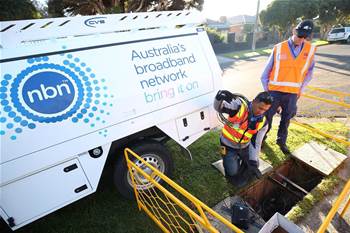The ACCC is set to reject another variation to the price and non-price terms that govern NBN Co’s existence.
Commissioner Anna Brakey said the ACCC “did not come to this draft decision lightly” - it has been considering the latest terms since they were lodged by NBN Co in late November last year.
The price and non-price terms are contained in a regulatory document known as the special access undertaking or SAU.
The draft decision won’t come as much of a surprise to NBN Co, which has been expecting this outcome since at least late March, according to a letter published today. [pdf]
But in practical terms, it’s the second time that NBN Co will have to withdraw a SAU proposal in the space of a year, and make changes before re-submitting it.
This is partly due to the process itself: the ACCC can only accept or reject an SAU proposal outright. It can suggest changes are made, but can’t make those changes itself.
The ACCC, NBN Co, retail service providers (RSPs) and the government have been trying to reach a mutually-agreeable outcome since early 2021, with some concessions achieved in that time.
The ACCC has produced a 104-page document on its draft reasons to reject the latest SAU draft.
This will likely be pored over particularly by NBN Co, which had been privately hopeful that any decision to reject would be accompanied with detailed reasons that could shorten the time needed to redraft the SAU into something that might get approved.
Brakey is hopeful that a workable SAU might not be too far away.
“While our draft decision is to reject this variation, we found a number of instances in the November 2022 SAU that improve the prospect of a future SAU variation being proposed with acceptable outcomes,” she said.
Communications minister Michelle Rowland said in a statement that she was also hopeful of a relatively quick re-drafting and re-submission on NBN Co's part, using guidance provided by the ACCC in its draft decision.
"We are pleased that NBN Co is continuing to engage constructively in the process and has written to the ACCC setting out a number of adjustments it is planning to make to its proposal," Rowland said.
"NBN Co has also stated its intention to shortly lodge an amended proposal, providing a clear pathway to new arrangements being settled."
An NBN Co spokesperson said it would "reflect on the ACCC’s draft decision" with a view to withdrawing the current proposal and "lodging an amended SAU variation proposal with the ACCC in early June 2023."
Brakey added that the SAU is “receiving such detailed attention” from regulators “because it will play such an important role in promoting competition and encouraging efficient broadband markets over its remaining term of 17 years.”
Reasons for rejection
Broadly, the ACCC intends to reject the current proposed SAU due to uncertainty created during the first three years of the agreement, and then again in arrangements post-2032.
A heavily-criticised feature of the proposed SAU is that it would raise the price of NBN Co's most popular residential product, its 50/20Mbps service, while leaving service standards set at 2020 levels.
The ACCC is unhappy at the prospect of no service level improvements before 2026.
But it wasn't immediately clear what recourse it would deem acceptable: that is, whether it wants higher standards embedded in the SAU from day one, or whether it simply wants to see an action plan for higher standards to emerge over time.
"A commitment to consult with retailers and consumer advocates over planned service improvements would ... assist NBN Co in more effectively resolving issues that drive poor consumer sentiment, including through reprioritising its investment and work programs," the ACCC said in a press release.
It's also not clear if an easy solution exists in the service standards space generally.
NBN Co is pinning future service standard improvements to having more of its network operating on full fibre, but this upgrade work will take years to complete.
The company is concerned that raising standards before that would come at a financial cost it cannot afford.
It has previously offered only limited service improvements [pdf] in the first three years, although it now says it will publish an "annual service improvement plan" for those three years to "provide transparency [around] initiatives focused on uplifting the RSP or end user experience commencing or continuing in the next 12 months."
In addition to service standards, the ACCC does not like the prospect of convergence of 50Mbps and 100Mbps pricing, a distinct possibility under the current SAU proposal.
The ACCC clarified that it had no issue with NBN Co raising the wholesale price of 50/20Mbps services by $5 a month or with a gradual phase-out of CVC bandwidth charges to mid-2026.
Its issues appear to be with pressuring customers up to 100Mbps services, and with the service level commitments NBN Co is prepared to make.
The ACCC wants NBN Co to cap the amount that can be charged for a 50Mbps service.
"We have asked NBN Co to further consider introducing a cap on the combined charge for buying a service under the standard 50Mbps wholesale offer," Brakey said.
"This is so that a service that is acquired under this wholesale offer would not cost more than the higher bandwidth 100Mbps wholesale offer, and the potential costs for these services would be limited to a more reasonable range.
"We are raising this for consideration alongside a proposal that NBN Co has made to retailers in commercial discussions."
Brakey added that the ACCC held concerns for the first three years of the SAU that "not enough would be done in the near term to address the issues that drive pockets of poor consumer sentiment with NBN services, take inefficient costs out of the retail supply chain, and promote retail competition."
"All of which [is] very important to keep retail prices lower and the customer satisfaction scores higher, that would drive efficient use of the NBN."
The ACCC said NBN Co could greatly assist with this part of the negotiation by being transparent with an "initial pricing roadmap and supporting worksheets."
The network operator has so far only published a "statement of pricing intent" and it was not particularly detailed.
"By NBN Co completing these actions, it would allow the SAU consultation process to focus on the core issues that go to the long-term regulatory framework, and allow stakeholders to contribute on a more informed basis," Brakey said.
There are also some outstanding issues with the post-2032 period, which could see significant price increases, in part due to backending and also to help NBN Co maintain a standalone credit rating.
This has been contentious since it was first raised, and the ACCC is no closer to liking it.
"We have found that the principles that had been proposed to guide regulatory determinations from 2032 would require revenue allowances that always gave NBN Co the opportunity to achieve a high credit rating, even if it invested or operated imprudently or inefficiently," the ACCC said.
"This would fundamentally create the wrong incentives for any regulated entity."
The ACCC also remains concerned that it would have limited powers or recourse post-2032.



























